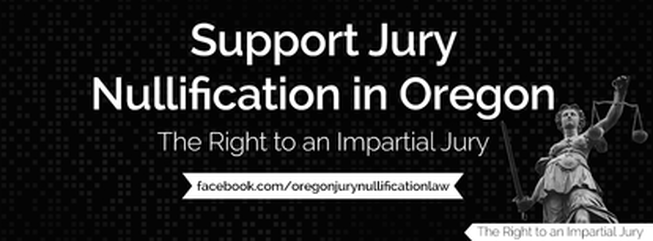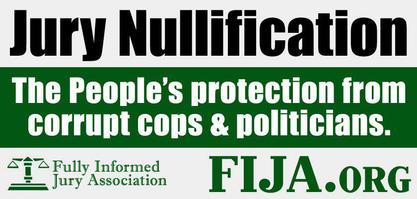Please contact the following Senators on the Judiciary Committee and politely ask them to vote yes on Senate Bill 924, the Oregon Jury Nullification Bill.
SB 924 is the Oregon Jury Nullification Bill
Does the right to an impartial jury exist?
The Sixth Amendment espouses that every individual has a right to an impartial jury. The impartiality of a juror will always be in question unless they are knowingly informed of their “power to acquit” and “right to nullify” even if guilt of the defendant is proven beyond reasonable doubt. The only way for a defendant to know that the jury of their peers is aware of this constitutionally enumerated right is if the Judge in their case explains this authority to the jury in the jury instructions. The term for this authority is “Jury Nullification.” There was a “Jury Nullification” bill recently introduced in the current 2017 Legislative Session. SB 924 is the Oregon Jury Nullification Bill It is a very important piece of historic legislation, which will need your support to show state senators and representatives that Oregonians believe in the Sixth Amendment of the US Constitution and the Sixteenth Amendment of the Oregon State Constitution. The Sixth Amendment as proposed by Congress in 1789 reads as follows: In all criminal prosecutions, the accused shall enjoy the right to a speedy and public trial, by an impartial jury of the State and district wherein the crime shall have been committed, which district shall have been previously ascertained by law, and to be informed of the nature and cause of the accusation; to be confronted with the witnesses against him; to have compulsory process for obtaining witnesses in his favor, and to have the Assistance of Counsel for his defence. The Oregon Constitution is one of the few state constitutions that specifically recognize a juror’s power to not only judge the defendant’s guilt in the case in question, but the law to which they are charged. The Sixteenth Amendment of the Oregon State Constitution reads as follows: Excessive bail and fines; cruel and unusual punishments; power of jury in criminal case. Excessive bail shall not be required, nor excessive fines imposed. Cruel and unusual punishments shall not be inflicted, but all penalties shall be proportioned to the offense.—In all criminal cases whatever, the jury shall have the right to determine the law, and the facts under the direction of the Court as to the law, and the right of new trial, as in civil cases. The legislative session in Oregon started on February 1, 2017 and it will end July 10, 2017. Please contact the following Senators on the Judiciary Committee and politely ask them to schedule a review of SB 924 and submit the bill for a full vote of the Senate. Right now SB 924 is in the Senate Committee On Judiciary Share the message & Like us on Facebook www.facebook.com/oregonjurynullificationlaw Zenger Trial Homepage
|
The Jury Nullification Bill, SB924, died in committee.
However, we plan to resurrect it next year. It will be brought back in the short session in 2018. Thank you all for the support.
Your browser does not support viewing this document. Click here to download the document.
| |||||||
|
Senate Bill Introduced in 2015 in the Oregon Senate
Died in Committee.
Your browser does not support viewing this document. Click here to download the document.
|
House Bill 3381 Introduced in 2015 in the Oregon House
Died in Committee.
Your browser does not support viewing this document. Click here to download the document.
|
Jury Nullification |
Do juries have the right to nullify? |
If jurors have the power to nullify, shouldn't they be told so? |



